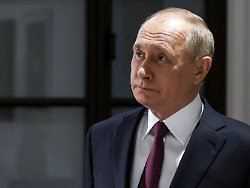Friday November 12th 2021
Conversation with Merkel
Putin: EU should negotiate with Belarus
Chancellor Merkel calls Russian President Putin again. He should use his influence on Belarus’ ruler Lukashenko in the refugee crisis on the Polish border. But the Kremlin does not want to take on the role of mediator without pressure.
Chancellor Angela Merkel spoke to Russian President Vladimir Putin again because of growing tensions over the situation of thousands of migrants in Belarus. It is important to solve the serious migration crisis on the borders of Belarus with the EU on the basis of international humanitarian norms, the Kremlin announced on Thursday after the phone call. The two had already phoned the day before. The Chancellor asked the Kremlin chief to intervene in the conflict. According to the Kremlin, Putin has now pleaded again for the restoration of contacts between the EU and Belarus.
The EU no longer recognizes ruler Alexander Lukashenko in Minsk as head of state after last year’s presidential election, which was deemed to be falsified. The Chancellor emphasized that “the Belarusian regime” is instrumentalizing “defenseless people in a hybrid attack against the European Union,” said the spokesman for the German government, Steffen Seibert.
The Belarusian opposition is also warning against direct negotiations that could legitimize Lukashenko. Rather, Lukashenko’s opponents are calling for new sanctions against the “regime” because, from their point of view, Minsk is using helpless migrants to exert pressure in the power struggle with the EU. After the threat of new sanctions against Russia became loud, the Kremlin gave in on Thursday and announced that Moscow wanted to contribute to solving the crisis.
UN Security Council laments “orchestrated instrumentalization”
In the evening, the UN Security Council also dealt with the refugee crisis on the border between Belarus and the EU. The US and the European members of the body have condemned the “orchestrated instrumentalization of people” by Minsk. The aim of the ruler Alexander Lukashenko’s action is to “destabilize the external border of the European Union,” said a joint statement after the closed session in New York. The statement, which was also followed by Norway and the UK, said Belarus’s aim is also to “destabilize neighboring countries” and “divert attention from its own growing human rights abuses”.
The emergency meeting called by Estonia, France and Ireland lasted a little over half an hour. Russia was not mentioned in the statement. Before the meeting, the Russian ambassador to the UN, Dmitri Polyansky, had assured that Moscow was not involved in sending migrants to the border with Poland and that allegations made by the West were rejected.
